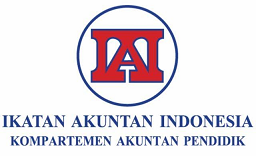PENGARUH INTELLECTUAL CAPITAL TERHADAP RETURN ON ASSETS
(STUDI EMPIRIS PADA PERUSAHAAN SEKTOR PERTAMBANGAN YANG LISTING DI BURSA EFEK INDONESIA PERIODE 2017-2020)
Abstract
Return on Assets is one of the indicators that can be used to measure how effectively a company utilizes its assets to generate profits and achieve competitive advantage in its performance. The Resources-Based Theory explains that the use of resources effectively and efficiently can be a competitive advantage for a company. Intellectual capital is a resource in the form of intangible assets that are believed to be able to create added value for an entity through the Value Added Intellectual Capital (VAIC™) method. Therefore, this study aims to determine the effect of Intellectual Capital as proxy for Value Added Capital Employed (VACA), Value Added Human Capital (VAHU), and Structural Capital Value Added (STVA) on Return on Assets (ROA). This research is in the form of quantitative research using descriptive statistical analysis methods and panel data regression analysis with secondary data sources and samples from mining sector companies listed on the Indonesia Stock Exchange for the 2017-2020 period. The results showed that simultaneously VACA, VAHU and STVA had a significant effect on ROA. However, partially VACA showed a significant negative effect on ROA, VAHU had a significant positive effect on ROA, and STVA did not have a significant effect on ROA.
Downloads
References
Devi, B. E., Khairunnisa, & Budiono, E. (2017). Pengaruh Intellectual Capital Terhadap Kinerja Keuangan Perusahaan (Studi Kasus Pada Perusahaan Elektronik, Otomotif dan Komponen yang Terdaftar di Bursa Efek Indonesia (BEI) Periode 2011-2015). E-Proceeding of Management, 4(1), 491–500.
Faradina, I., & Gayatri. (2016). Pengaruh Intellectual Capital Dan Intellectual Capital Disclosure Terhadap Kinerja Keuangan Perusahaan. E-Jurnal Akuntansi, 15(2), 1623–1653.
Firdaus, M. F., Dillak, V. J., & Khairunnisa, S. M. (2019). Pengaruh Profitabilitas, Leverage, Dan Ukuran Perusahaan Terhadap Nilai Perusahaan (Studi Empiris Pada Perusahaan Sektor Pertanian Yang Terdaftar Di Bursa Efek Indonesia Periode 2014-2017). EProceedings of Management, 6(3), 642-669.
Ghozali, I. (2016). Aplikasi Analisis Multivariete dengan Program IBM SPSS 23 (8 cetakan). Badan Penerbit Universitas Diponegoro.
Mitchell Williams, S. (2001). Is Intellectual Capital performance and disclosure practices related? Journal of Intellectual Capital, 2(3), 192–203.
Muchlis, F. A., &, Dr. Leny Suzan, S.E., M. S. (2020). Pengaruh Intellectual Capital Terhadap Kinerja Keuangan (Studi Empiris pada Perusahaan Sub Sektor Properti dan Real Estate yang Terdaftar di Bursa Efek Indonesia Periode 2015-2018). E-Proceeding of Management, 7(1), 779-781.
Nurhasanah, A., Suzan, L., & Muslih, M. (2017). Pengaruh Intellectual Capital Terhadap Kinerja Keuangan Perusahaan (Studi Pada Sub Sektor Perdagangan Besar yang Listing di Bursa Efek Indonesia Periode 2012-2017). E-Proceeding of Management, 4(3), 2817-2819.
Surbakti, S. K. B., & Dr. Leny Suzan, S.E., M. S. (2020). Pengaruh Intellectual Capital Terhadap Kinerja Keuangan Perusahaan (Studi pada Perusahaan Manufaktur Sektor Industri Barang Konsumsi yang Terdaftar di Bursa Efek Indonesia Periode 2016-2018). E-Proceeding of Management, 7(3), 2812-2814.
Jurnal Akutansi dan Keuangan allows readers to read, download, copy, distribute, print, search, or link to the full texts of its articles and allow readers to use them for any other lawful purpose. The journal allows the author(s) to hold the copyright without restrictions. Finally, the journal allows the author(s) to retain publishing rights without restrictions
Authors are allowed to archive their submitted article in an open access repository
Authors are allowed to archive the final published article in an open access repository with an acknowledgment of its initial publication in this journal






